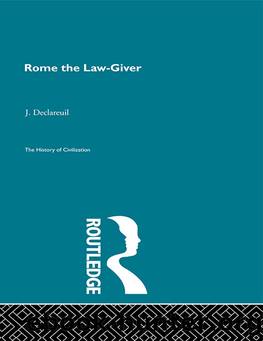Rome the Law-Giver by J. Declareuil

Author:J. Declareuil [Declareuil, J.]
Language: eng
Format: epub
Tags: History, General
ISBN: 9781136197628
Google: GOyYDwAAQBAJ
Publisher: Routledge
Published: 2013-10-11T17:09:13+00:00
II. Private Delicts and their Sanctions in the Law of the Twelve Tables and in the Civil Law
Henceforward we are concerned only with private delicts, for Rome had reached the stage at which Law has become paramount, private justice has been set aside, except that limited and easily controllable form of it which involves the killing of a thief caught by night and armed,2 and the State, without forbidding amicable settlements,3 has imposed its own scale of penalties instead: scourging and slavery for the thief taken in the fact (death if he is a slave) and for the receiver assimilated to him in consequence of formal search for the stolen object (quÅstio lance licioque);4 retaliation in kind upon the breaker of a limb; a fine fixed at 300 or 150 asses for the assailant who had fractured a bone; 25 asses for any other personal injury or for the cutting down of a tree;1 double the value of the wrong in the case of a thief not taken in the fact, a usurer, a depositary who did not repay the deposit, a vendor who did not prevent the distress of the thing sold or misrepresented the area of the land sold, a guardian guilty of maladministration; three times the value in the case of an ordinary receiver; an expiatory sacrifice (piaculum) for accidental homicide, etc. From that time forward a delict is merely an act against which the Law authorizes reaction in accordance with a formal ritual and in pursuit of a penalty prescribed by itself. Formerly the injured party avenged himself as far as he could; now the Law established the principle of equivalence, pÅna noxiÅ par esto.2 By describing the illegal act, which always had to be positive and due to direct contact between the offender and the corpus delicti, it left no room for any doctrinal interpretation and bound the judge to its text.
This manner of regarding the delict in its material aspect caused, in some cases, closely analogous acts to be made the object of different dispositions (e.g. the breaking of a limb and the fracture of a bone), in others, acts clearly distinguished by more developed legislations to be blended together in a single species, e.g. theft (furtum), which then included any fraudulent handling (contrectatio) of the property of others, whether moveable or immoveable. Even intent to enrich oneself (animus lucrandi) was not necessary and was not made part of the essence of theft before Justinian.3 This was because the moral intention of the agent still counted for nothing in estimating the delict. In primitive societies man instinctively reacted with all his might against whatsoever injured him, making a direct attack upon the visible cause of the injury or loss and looking for nothing behind it. Law which moderated his violence and provided a channel for it, nevertheless followed its lead as soon as resentment was shown. The punishment which was made commensurate with the injured party's anger and resentment or with the degree of
Download
This site does not store any files on its server. We only index and link to content provided by other sites. Please contact the content providers to delete copyright contents if any and email us, we'll remove relevant links or contents immediately.
Collaborating with Parents for Early School Success : The Achieving-Behaving-Caring Program by Stephanie H. McConaughy; Pam Kay; Julie A. Welkowitz; Kim Hewitt; Martha D. Fitzgerald(899)
Entrepreneurship Education and Training: The Issue of Effectiveness by Colette Henry Frances Hill Claire Leitch(666)
Adding Value to Policy Analysis and Advice by Claudia Scott; Karen Baehler(499)
Materializing the Middle Passage by Jane Webster;(497)
Race and American Political Development by unknow(489)
Sociological Perspectives of Health and Illness by Constantinos N. Phellas(478)
American Government and Politics Today by Steffen W. Schmidt Mack C. Shelley Barbara A. Bardes(477)
Human and Global Security : An Exploration of Terms by Peter Stoett(473)
Control Of Oil - Hardback by Kayal(467)
Advances in Child Development and Behavior, Volume 37 by Patricia J. Bauer(403)
The Disappearance of Rituals: A Topology of the Present by Byung-Chul Han(401)
The Catholic Church and European State Formation, AD 1000-1500 by Jørgen Møller(392)
The World According to China by Elizabeth C. Economy(385)
Left Is Not Woke by Susan Neiman(371)
Theories of Counseling and Psychotherapy: A Case Approach by Nancy L. Murdock(371)
Application of classical statistics, logratio transformation and multifractal approaches to delineate geochemical anomalies in the Zarshuran gold district, NW Iran by unknow(364)
Cross-Cultural Child Development for Social Workers by Lena Robinson(358)
Turkey's Relations with the West and the Turkic Republics: The Rise and Fall of the Turkish Model by Idris Bal(353)
Japan's Ainu Minority in Tokyo by Mark K. Watson(340)
